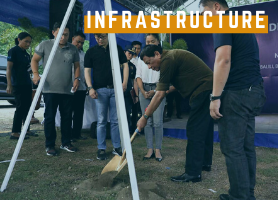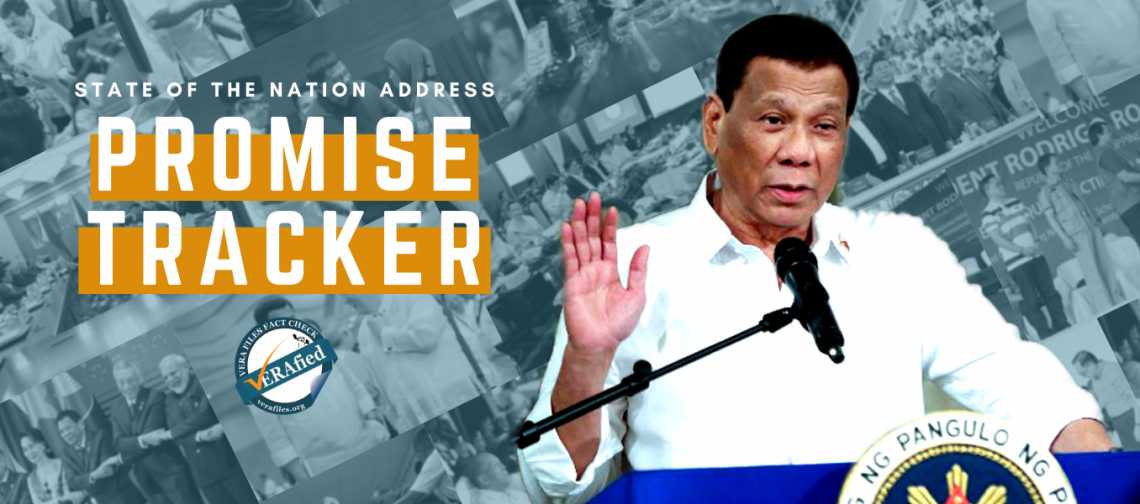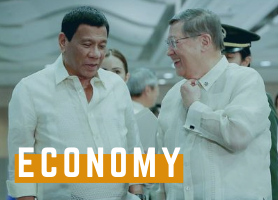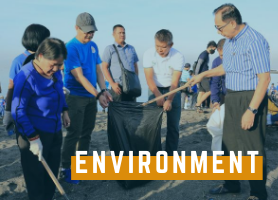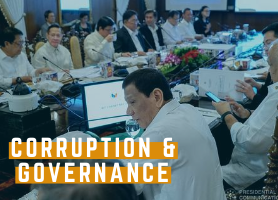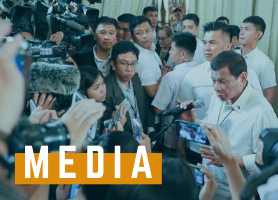With two years remaining in President Rodrigo Duterte’s term, the government is “still committed” to complete “many” of its projects under the government’s ambitious Build, Build, Build (BBB) program.
“While this pandemic may have disrupted the implementation of projects, with the right mindset, scientific advice and our whole-of-government approach, we are still committed to complete many of our projects within the next two and a half years,” Public Works and Highways Secretary Mark Villar said in a forum ahead of Duterte’s fifth State of the Nation Address (SONA) on July 27.
Villar’s reassurance comes amid the coronavirus disease 2019 (COVID-19) pandemic that has affected multiple sectors of the country. Referencing the shutdown of economic activities due to the community quarantine measures imposed in mid-March, Finance Secretary Carlos Dominguez said the BBB can help stimulate economic recovery and generate jobs due to “infrastructure spending’s high multiplier effect of raising incomes, stimulating demand and generating new jobs and businesses.”
In its latest report, the National Economic and Development Authority’s (NEDA) list of big ticket projects increased from just 75 in 2019 to 100 projects as of Feb. 17. Among these projects are new railway systems, bridges, roads, and information and communications technology facilities expected to be completed this year and in the coming years.
In 2019, the government was able to fulfill four out of the 12 infrastructure promises of Duterte: the entry of a third major player in the telecommunications industry; the construction of new airports, via funding from China; the construction of bridges along Pasig River, also via funding from China; and the installation of free WI-FI access in public areas. (See SONA 2018 Promise Tracker: Infrastructure)
As Duterte’s administration enters its fifth year, here is the list of the president’s promises and how he has fared in the infrastructure sector:
PROMISE: Improve hometown’s Davao International Airport
|
|
“Alam naman ninyo. Magaganda na ang airport ninyo. Inuna ko nga kayo eh. Everybody’s complaining about the Davao airport and I said, ‘Davao will be the last.’ Kung hindi na maabutan, sabi ko mga taga-Davao, pasensya na kayo. Para walang masabi ang Congress sa atin, baka nga 3% sila doon sa kabila.” (SONA 2019) |
|
The modernization of Davao International Airport, also known as Francisco Bangoy International, has not yet started pending final government approval. In December 2019, the NEDA-Investment Coordination Committee (ICC) endorsed the P48.9 billion unsolicited proposal of Chelsea Logistics Holdings Corp., one of the subsidiaries of Udenna Corporation owned by Duterte’s friend Dennis Uy, to the NEDA Board. Once the NEDA Board finally approves Chelsea Logistiscs’ proposal, a Swiss challenge will be held to give rival bidders the chance to outbid Chelsea. Uy’s company proposes an “operate-add-transfer” project scheme, with a concession period of 30 years, aiming to boost passenger traffic at the airport by up to 15.1 million per year. Davao airport is the third largest airport in the country next to Mactan and Ninoy Aquino international airports. According to the Department of Transportation (DOTR), the company’s proposal covers “reconfiguration and expansion of the terminal building, construction of parallel taxiway, improvement of airside and landside facilities, installation of modern airport IT systems, and all activities needed to improve airport services.” Phase 1 of the project will start this year and is set to be completed by 2028. The plan to rehabilitate the Davao airport was first approved in 2014 under the Regional Airports PPP Projects, but the previous administration failed to bid out the airport projects in two bundles. The Duterte government then unbundled the airports and bid them out individually under the Public-Private Partnership (PPP) scheme. But the DOTR scrapped in May 2017 the PPP funding mode for the airports and resorted to funds from government or foreign funding. |
PROMISE: Maximize the use of existing roads
|
|
“I reiterate my directive, my request, my pleadings to the MMDA and all concerned local officials in Metro Manila, and all other cities, to undertake immediate action to ensure the speedy and smooth flow of vehicular traffic. Reclaim all public roads that are being used for private ends. Marami diyan.” (SONA 2019) “To address lack of road infrastructure in Metro Manila, usage of existing roads will be maximized. Thus, there is a need to cooperate and coordinate with LGUs to map out secondary routes and to consult various stakeholders, including the public transport operators.” (SONA 2016) |
|
The second round of nationwide road clearing operations led by the Department of Interior and Local Government (DILG) has been suspended to keep local chief executives focused on their COVID-19 responses. In February, DILG said the first round of road clearing that lasted for 60 days in 2019 resulted in a total of 6,682 primary and secondary roads cleared from all types of obstructions such as vehicles parked in prohibited areas like sidewalks. But the department noted that 97 out of 1,245 local government units were found non-compliant to road clearing directives. It already filed administrative charges with the Ombudsman against 12 out of 97 officials after showing “negligence, dereliction of duty, and lack of cooperation” despite issuance of show cause orders. In his SONA in 2019, Duterte asked Interior Secretary Eduardo Año to suspend non-compliant officials. |
PROMISE: Increase the government’s infrastructure spending
|
|
“We are targeting to increase Government spending on infrastructure from 5 percent of the GDP in 2017 to 7 percent of the GDP by 2022, amounting to a total of eight to nine trillion pesos or 160 to 180 billion dollars in infrastructure projects.” (SONA 2017) |
|
Despite the delay in the passage of the 2019 budget, Finance Secretary Carlos Dominguez said the government was able to “catch up and accelerate” infrastructure spending in 2019 by P1.049 trillion or 5.4 percent of the Gross Domestic Product (GDP) from P886.17 billion or 4.9 percent in 2018. During the 2020 Pre-SONA forum of the economic and infrastructure cabinet clusters, Dominguez boasted that the record-high 16.1 percent of GDP in 22 years “provided solid footing” for the Build, Build, Build (BBB) program. In 2019, he said the government expects to spend seven percent of GDP, or almost P1.810 trillion, in 2022. |
PROMISE: Pave the way for the Golden Age of Infrastructure
|
|
“We will make the few years the Golden Age of Infrastructure in the Philippines to enhance our mobility and connectivity, and thereby spur development [and equitable growth] in the country. In other words, we are going to Build, Build and Build.” (SONA 2017) |
|
Flagship infrastructure projects of the government have increased from just 75 in 2019 to 100 as of February 2020. The revised list of flagship projects as of Feb. 17 from NEDA shows these infrastructures, such as new roads, airports, and bridges, among others, are still in various stages of implementation. Among the projects expected to be completed this year are the Metro Manila Skyway Stage 3, Clark International Airport Expansion Project Phase 1, and Bicol International Airport. Others are still under construction or awaiting government approval, with some scheduled for completion beyond 2022. |
PROMISE: Improve road infrastructures to address worsening traffic conditions
|
|
“We shall complete strategic road and bridge projects and some of the road sections shall be widened and improved to address the worsening traffic.” (SONA 2017) |
|
The government has already built and repaired a total of 4,959 bridges and 23,657 kilometers of roads all over the country as of May 2020, according to Villar’s presentation during a pre-SONA forum. Some of the traffic-solution projects consisting of new roads and bridges in Metro Manila are still under construction. Among the ongoing road projects are the Skyway Stage 3 project, which allows for travel from Buendia, Makati City to NLEX Balintawak, Quezon City in just 15-20 minutes, and the Segment 10 and C3-Radial Road 10 (C3-R10) sections of the NLEX (North Luzon Expressway) Harbor Link, which reduces the one-hour travel time from CAMANAVA (Caloocan, Malabon, Navotas, Valenzuela) to NLEX to just 10 minutes. Villar said Skyway Stage 3 is 83 percent completed and is targeted to be in operation later this year, reducing the number of vehicles passing along EDSA every day by at least 55,000. The NLEX Harbor Link, Skyway Stage 3 and the NLEX-SLEX Connector Road, which form part of a network of expressways bypassing vehicles from EDSA, are funded through the PPP scheme. Meanwhile, works under the Metro Manila Logistics Improvement Program, which intends to build 12 new bridges crossing major river systems such as Pasig and Marikina rivers, are also ongoing. Among the projects still under construction are the Bonifacio Global City (BGC)-Ortigas Center Link Road Project, which will reduce travel time between BGC and Ortigas business districts to 12 minutes, and the China-funded Estrella-Pantaleon and Binondo-Intramuros bridges, which connect Estrella Street in Makati and Barangka Drive in Mandaluyong and Intramuros and Binondo in Manila, respectively. Villar said the Estrella-Pantaleon and Binondo-Intramuros bridges will be completed in December 2020 and March 2021, respectively, while the BGC-Ortigas bridges are 80 percent complete. |
PROMISE: Establish a National Government Portal for efficient public service
|
|
“The National Government Portal, which we launched recently, will allow faster and easier delivery of public services and reduce the number of visits of the public to agencies for government transactions.” (SONA 2017) “All government agencies are instructed to enable their clients to submit applications for coordination to other agencies combined… And national portal, yes because it’s our… parang website.” (SONA 2016) |
|
The Department of Information and Communications Technology (DICT) has yet to release a report on the effectiveness of the National Government Portal (NGP) in providing faster and easier delivery of government services. NGP is the government’s official “one-stop-shop” website (accessible through gov.ph) that will aggregate government data, information, and services from all government agencies. It is one of the flagship projects of DICT that aims to establish e-government, which is the use of information technologies in public administration, in the country and is expected to be completed in 2022. As of July 18, NGP lists at least 200 e-services being offered by various government agencies such as calculation of withholding tax and renewal of National Bureau of Investigation (NBI) multipurpose clearance. Meanwhile, data from the United Nations (UN) E-government Knowledgebase show the Philippines is lagging in terms of e-government readiness compared to other countries. From the 33rd spot in 2003, the country slid in the global rankings to 75th out of 193 states in 2020 in terms of e-government development index (EGDI), used as basis of the biennial UN e-government survey. It also dropped from 19th in 2018 to 57th place in 2020 in the e-participation index, a supplementary index to the EGDI that shows the involvement of citizens in governance through online services. Although the country ranks behind most countries, the NGP team argued this is just a global trend as most countries adopt technology in their system. The NGP team uses the UN survey to determine “which portal contents impact on public administration, e-government and ICT readiness.” |
PROMISE: Connect the islands of the country through road infrastructures
|
|
“We shall pursue inter-island linkage projects.” (SONA 2016) |
|
The Duterte administration has already built and repaired 4,959 bridges as of May 2020, connecting different parts of the country. Villar said the government is building inter-island/mega bridges that will connect scattered island groups in the country, such as Tawi-Tawi, with short and long spanned bridges. He presented eight inter-island bridge projects during the event compared to 17 in 2019. Among these projects, which are in various stages of implementation, are the Bataan-Cavite Interlink Bridge (32.15 kilometers), the Panguil Bay Bridge (3.17 kilometers), and the Panglao-Tagbilaran City Offshore Connector Bridge (2.71 kilometers). He said the Panguil Bay bridge, which is nearing completion, will be the longest bridge in the country that will make travel time between Tubod, Lanao Del Norte and Tangub, Misamis Occidental in just seven minutes compared to 2.5 hours in the former 100-kilometer route. |
PROMISE: Create a National Broadband Plan to fast-track the deployment of “infostructures” and improve internet speed
|
|
“I have also ordered the newly-created DICT, Information and Communication Technology, to develop a National Broadband Plan to accelerate the deployment of fiber optic cables and wireless technologies to improve internet speed.” (SONA 2016) |
|
The National Broadband Plan (NBP) is still in progress following its rollout in 2017. Latest accomplishments of the government include the successful testing of 158 dark fiber segments, or the unused fiber cables, of the National Grid Corporation of the Philippines (NGCP) and the completed construction of two cable landing stations in Baler, Aurora and San Fernando, La Union, which will serve as landing sites for international submarine cables. Meanwhile, ongoing projects include the lighting of 124 nodes of NGCP by 2021, procurement of additional equipment, and the completion of the 250 kilometer terrestrial network which will connect the Aurora and La Union landing stations at the end of July. The NBP was designed as the “blueprint” in establishing infostructures (portmanteau of information structures) in the country to fast-track the deployment of fiber-optic cables and wireless technologies, and improve the reliability and affordability of the internet. Once the NBP implementation is completed, the country will be able to access 2-terabyte capacity of broadband internet by 2021. |
PROMISE: Implement anti-colorum campaign and dismantle illegal terminals
|
|
“Our anti-colorum campaign and out-of-line apprehension including the removal of terminals will be intensified and, my God, it will be done. Immediately, immediately.” (SONA 2016) |
|
Four years into Duterte’s term, the government is still dismantling illegal terminals and out-of-line vehicles. The latest available government tally shows that, as of February 2020, the Inter-Agency Council for Traffic (i-ACT), a multi-agency task force assigned to resolve traffic problems in the country, has already impounded 2,641 colorum vehicles. The latest apprehension by i-ACT includes four colorum company shuttles in Makati that were also impounded for illegally operating without permits. But Transportation Assistant Secretary Manuel Gonzales, i-ACT chief, said on July 7 the task force will postpone anti-colorum operations to focus on guiding commuters on EDSA. Several changes on EDSA have been implemented such as the carousel project, which designates the innermost lane exclusive only for buses, and fixing of bicycle lanes. These changes followed the suspension of public transportation in Metro Manila and other parts of the country due to COVID-19 lockdowns starting mid-March that left workers with no choice but to walk or use their personal vehicles to get to work. The crackdown on illegal terminals is also continuous. In November 2019, the Quezon City government closed down the Baliwag bus depot along North EDSA for illegally operating as a terminal. |
Sources
PTV, PANOORIN: Tatak Ng Pagbabago Economic Development and Infrastructure Clusters, July 7, 2020
Presidential Communications Operations Office, PCOO sets Virtual Presser for 2020 Pre-SONA – Presidential Communications Operations Office, July 7, 2020
Presidential Communications Operations Office, Gov’t imposes community quarantine in Metro Manila to contain coronavirus, March 13, 2020
Department of Finance, ‘Build, Build, Build’ to break vicious circle of weak supply & demand, June 1, 2020
National Economic Development Authority, Revised List of Infrastructure Flagship Projects as of Feb. 17, 2020, Feb. 17, 2020
National Economic Development Authority, Infrastructure Flagship Projects Matrix 2019 , July 2019
On increasing infrastructure spending
- RTVMALACANANG, 2017 State of the Nation Address, July 23, 2018
- PTV, PANOORIN: Tatak Ng Pagbabago Economic Development and Infrastructure Clusters, July 7, 2020
- Department of Finance, REGAININGMOMENTUM,ACCELERATING RECOVERY IN A POST-COVID-19 WORLD, Accessed July 17, 2020
- Secretary Carlos Dominguez, 2019 Pre-SONA Economic and Infrastructure Forum, PICC, Pasay City, July 1, 2019, July 2, 2019
On the golden age of infrastructure
- RTVMALACANANG, 2017 State of the Nation Address, July 23, 2018
- National Economic and Development Authority, Status of Infrastructure Flagship Projects (As of April 30, 2019)
- National Economic Development Authority, INFRASTRUCTURE FLAGSHIP PROJECTS (as of February 17, 2020), February 17, 2020
- Department of Finance, INFRASTRUCTURE CLUSTER PERFORMANCE HIGHLIGHTS, Accessed July 17, 2020
On addressing worsening traffic conditions
- RTVMALACANANG, 2017 State of the Nation Address, July 23, 2018
- Department of Finance, INFRASTRUCTURE CLUSTER PERFORMANCE HIGHLIGHTS, Accessed July 17, 2020
- Department of Public Works and Highways METRO MANILA SKYWAY STAGE 3 (MMSS-3), Accessed July17, 2020
- Department of Public Works and Highways, Villar: NLEX Harbor Link Malabon Exit now open, cuts travel time from NLEX to CAMANAVA in 10 mins, Feb. 21, 2020
- Build, Build, Build website, NLEX Harbor Link, Segment 10, Accessed July 17, 2020
- Public-Private Partnership, Metro Manila Skyway (MMS) Stage 3, Accessed July 17, 2020
- Build, Build, build website, NLEX-SLEX Connector Road, Accessed July 17, 2020
- North Luzon Expressway, NLEX-Connector map, Accessed July 17, 2020
- Presidential Communications Operations Office, President Duterte breaks ground for two China Grant-Aid bridges, July 17, 2018
- Department of Public Works and Highways, DPWH INSPECTION SEES ESTRELLA-PANTALEON, BINONDO-INTRAMUROS BRIDGES RIGHT ON TRACK FOR DECEMBER 2020, MARCH 2021 COMPLETION, July 24, 2020
On connecting islands through road infrastructure
- RTVMALACANANG, 2016 State of the Nation Address, July 25, 2016
- Department of Finance, INFRASTRUCTURE CLUSTER PERFORMANCE HIGHLIGHTS, Accessed July 17, 2020
- PTV, PANOORIN: Tatak Ng Pagbabago Economic Development and Infrastructure Clusters, July 7, 2020
- Secretary Carlos Dominguez, 2019 Pre-SONA Economic and Infrastructure Forum, PICC, Pasay City, July 1, 201, July 2, 2019
On establishing a national government portal
- RTVMALACANANG, 2017 State of the Nation Address, July 23, 2018
- RTVMALACANANG, 2016 State of the Nation Address, July 25, 2016
- Gov.ph, National Government Portal Overview, Accessed July 17, 2020
- Department of Information and Communications Technology, E-Government Masterplan 2022, Accessed July 17, 2020
- Gov.ph, About GOVPH, Accessed July 17, 2020
- Gov.ph, 2019 NGP PROJECT IMPLEMENTATION PLAN, Accessed July 17, 2020
- United Nations E-Government Knowledgebase, Philippines, Accessed July 17, 2020
- United Nations E-Government Survey 2020 publication, 2020
On a national broadband plan
- RTVMALACANANG, 2016 State of the Nation Address, July 25, 2016
- PTV, PANOORIN: Tatak Ng Pagbabago Economic Development and Infrastructure Clusters, July 7, 2020
- Department of Finance, INFRASTRUCTURE CLUSTER PERFORMANCE HIGHLIGHTS, Accessed July 17, 2020
- Secretary Carlos Dominguez, 2019 Pre-SONA Economic and Infrastructure Forum, PICC, Pasay City, July 1, 2019, July 2, 2019
- Department of Information and Communications Technology, National-Broadband-Plan, 2019
On the Davao International Airport
- RTVMalacanang, State of the Nation Address (SONA) 2019 07/22/2019, July 22, 2019
- Public-Private Partnership, Davao International Airport Development, Operation, and Management, Accessed July 17, 2020
- National Economic Development Authority, ICC-CABCOM ENDORSES 12 PROJECTS FOR NEDA BOARD APPROVAL,Jan. 2, 2020
- Department of Transportation, MODERNIZATION OF DAVAO INTERNATIONAL AIRPORT INCHES CLOSER TO IMPLEMENTATION AFTER GETTING NEDA-ICC APPROVAL, Jan. 2, 2020
- Department of Transportation, Regional Airports Public-Private Partnership (PPP) Project
- Presidential Communications Operations Office, National Economic Development Authority approves major infrastructure projects in 15th board meeting Oct. 18, 2014
- Chelsea Holdings Logistics Corp., Dennis A. Uy, Accessed July 19, 2020
- Public-Private Partnership, 2016_Annual Report
- GMA News N, DOTr scraps PPP mode for 5 regional airports project, May 23, 2017
- Business Mirror, Government scraps plans to upgrade 5 regional airports via PPP mode, May 23, 2017
- Inquirer.net, 5 regional airports removed from PPP, May 24, 2017
On anti-colorum campaign, illegal terminals
- RTVMALACANANG, 2016 State of the Nation Address, July 25, 2016
- Inter-Agency Council for Traffic-I-ACT Official Facebook page, About
- Metropolitan Manila Development Authority, i-ACT Reactivated for Seamless Coordination on Traffic, Sept. 6, 2017
- Metropolitan Manila Development Authority July 1, 2020 MMDA: Faster Travel Time for Commuters Through Edsa Carousel, July 1, 2020
- UNTV News and Rescue, I-ACT to postpone anti-colorum ops; to focus on assisting passengers on EDSA, July 7, 2020
- i-ACT, (4) COMPANY SHUTTLE SERVICES WITH NO VALID CONTRACT OF LEASE FLAGGED AS COLORUM AND IMPOUNDED ALONG MAKATI THIS MORNING, July 4, 2020
- Inquirer.net, Traffic-causing QC bus terminal had no permit, Nov. 7, 2019
- CNN Philippines, QC gov’t orders closure of bus terminal in North Edsa, Nov. 6, 2019
- Rappler.com, MMDA, QC gov’t shut down Baliwag bus depot along North Avenue, Nov. 6, 2019
On maximizing existing roads
- RTVMalacanang, State of the Nation Address (SONA) 2019 07/22/2019, July 22, 2019
- RTVMALACANANG, 2016 State of the Nation Address, July 25, 2016
- Department of Interior and Local Government, Continued Implementation of the Presidential Directive to Clear Roads of Illegal Obstructions (ROAD CLEARING 2.0) – Issuances, Feb. 7, 2020
- Department of Interior and Local Government, DILG PUBLIC ADVISORY NO. 1 Statement on suspension of Road Clearing Operations 2.0 and restriction of foreign travel of local gov’t officials, March 16, 2020
- Department of Interior and Local Government, DILG to LGUs: Clear local roads in 75 calendar days, brings Disiplina Muna campaign to the barangays – News – DILG, Feb. 17, 2020
(Guided by the code of principles of the International Fact-Checking Network at Poynter, VERA Files tracks the false claims, flip-flops, misleading statements of public officials and figures, and debunks them with factual evidence. Find out more about this initiative and our methodology.)
